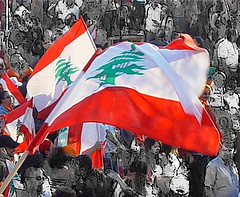Letters from Lebanon: March 14th
By Ben Judah for ISN
St Martyr's Square at the heart of Beirut is the old dividing line between the mostly Muslim western districts and Christian East Beirut. Today it has taken on a different significance.
In 2005, protesters massed in the square, eventually coming to such a crunch point on 14 March that the decades-long Syrian occupation was forced out of Lebanon. Since then, March 14th has come to mean a western-orientated political coalition of parties committed to keeping Syrian influence in Lebanon to a minimum.
The square is empty in the late afternoon, but still it is filled with symbolism. On the side of the Headquarters of the Christian Ketaeb, also know as the Phalangists, there is a large mural of the assassinated leader Pierre Gemayel. Further up rises the large, modern Rafik Hariri mosque, where Lebanon's assassinated March 14th prime minister is laid to rest.
I am standing underneath the An Nahar building, a modern glass construction with a large hanging bearing the face of the murdered journalist and lawmaker Gibran Tueni. All were leaders in the coalition who paid with their lives for their achievements.
Gibran Teuni's daughter, Nayla Tueni, is now the deputy-managing editor of the An Nahar newspaper where her father worked. There is a great dissatisfaction in her voice when she talks about politics. Nayla is often tipped for a bright future in this field, but she has no desire to be a politician for the moment. "We need a new kind of politics in the country, one that is no longer made up of blind followers, corrupt self-serving leaders and is actually interested in getting to grips with the social and infra-structural problems that make up real change," she says.
Nayla's attitudes are echoed by many average March 14th supporters.
Jean Saade was one of the protesters who camped out for days in St Martyr's Square back in 2005. He is deeply disillusioned. "March the 14th was a day, whose name and significance was appropriated by political parties that had for the most part worked with and for the occupying power. They rode the wave and put themselves in power, all the energy and ideas we where having on the square about ending sectarianism and really transforming the system is not their agenda. They proved to be too much parts of the system and unable to change it."
Such criticisms are common throughout Lebanon. People frequently refer to the March 14th political parties as clans, patronage systems or self-serving vehicles. The Lebanese dryly remind me that the most hotly contested portfolios in the new Cabinet were those with the most patronage available, such as public works or telecommunications.
Indeed, on closer inspection, most March 14th parties, whilst pledging their commitment to modern politics, lack the basic institutional capacities such as public forums, membership lists, regular newsletters and so on. And on all core matters such as social policy or health care they lack clear agendas or real expertise. Self-interested networks of elites stall progress on certain issues of liberalization.
This goes a long way to explaining how the huge enthusiasm shown in 2005 has withered in Lebanon, and a sullen and depressed attitude towards politics has taken hold.
Part of this can be explained by the fact that the March 14th coalition was faced with an incredibly difficult situation: an internal terror campaign that placed them under virtual house arrest and cost them many MPs; confrontation with Israel that strengthened Hizbollah; and a Jihadist takeover of the major Palestinian camp of Nahr el-Barad.
However, such a situation might have rallied people to their cause had the leadership not proved themselves to be so much in the old mold, incapable of coming up with creative answers to challenges and delivering the necessary social and economic transformations.
In many ways, the March 14th leadership squandered what could have been a rallying cry by failing to show their supporters what actual changes in the system they were fighting for on the ground.
After meeting, Nayla Tueni and I wandered over to the re-built downtown, clean and quiet Arabised Parisian buildings, to meet Nadim Shehadi, a political analyst and Chatham House representative of his country. When I ask if he feels the March 14th movement has failed, he compares what happened in May to an 18th century duel.
"Imagine if your opponent challenges you to a duel at a time when you are set to lose, in a place that will defeat you and with a weapon to which you have no defenses. If you manage to change the time, place and nature of the duel - live to tell the tale and emerge from it with your honor, then you may be seen as the victor of the duel."
Shehadi argues that because Hizbollah challenged the March 14th coalition to a confrontation militarily, it could not win. Though the coalition's decision not to fight back and to transfer the end game to Doha, they kept the process political, which was the best possible outcome of the situation.
"What I need to stress now is the fact that Lebanon is […] calm. Large [numbers] of tourists are returning, things are quiet. There is a political battle and that is the way it will stay for the moment," he says.
March 14th successfully avoided a Civil War and survived an almost impossible situation. Maybe only politicians of genius would have done better faced with such challenges. However, the fact remains that in winning one side of the battle - keeping the civil war political - the March 14th movement might still lose by being oddly the least politically appealing.

